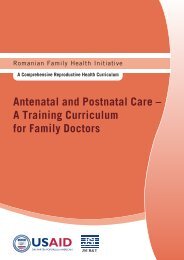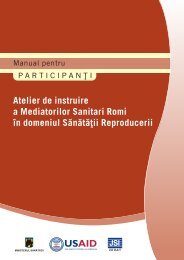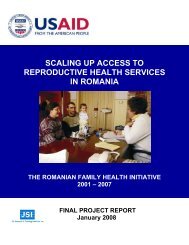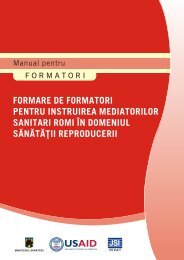Training of Roma Health Mediators in Reproductive Health
Training of Roma Health Mediators in Reproductive Health
Training of Roma Health Mediators in Reproductive Health
You also want an ePaper? Increase the reach of your titles
YUMPU automatically turns print PDFs into web optimized ePapers that Google loves.
• One who is fully <strong>in</strong>formed and is absolutely certa<strong>in</strong> that s/he wants no more children<br />
• Women who have a health condition which makes pregnancy very risky.<br />
Discus the myths and rumors <strong>in</strong> relation to tubal ligation and vasectomy and how to<br />
dispel them.<br />
f) EMERGENCY CONTRACEPTION (10 m<strong>in</strong>utes)<br />
Expla<strong>in</strong> that for different reasons, people sometimes have “unprotected sex”. Ask<br />
participants to def<strong>in</strong>e situations <strong>in</strong> which unprotected sex is more likely to happen. List<br />
the answers on the flipchart.<br />
• Woman has sexual <strong>in</strong>tercourse without contraception (unplanned <strong>in</strong>tercourse)<br />
• Woman has sex aga<strong>in</strong>st her will<br />
• Woman uses a contraceptive method but it fails:<br />
o the condom breaks<br />
o the IUD has been expelled<br />
o the woman vomits with<strong>in</strong> an hour <strong>of</strong> tak<strong>in</strong>g her pill<br />
• The woman has <strong>in</strong>correctly used the contraceptive method:<br />
o she has forgotten to take the pill<br />
o she has delayed her follow-up visit for a new dose <strong>of</strong> <strong>in</strong>jectable contraceptive<br />
o she has done a vag<strong>in</strong>al douche with<strong>in</strong> less than 6 hours after us<strong>in</strong>g spermicidal<br />
jelly, etc.<br />
Expla<strong>in</strong> that <strong>in</strong> any <strong>of</strong> these situations, another type <strong>of</strong> contraceptive is available, named<br />
emergency contraception.<br />
Emphasize that this type <strong>of</strong> contraception should not be used on a rout<strong>in</strong>e or a regular<br />
basis (“<strong>in</strong> place <strong>of</strong> family plann<strong>in</strong>g methods”), but only <strong>in</strong> emergency situations (when<br />
unprotected sex has occurred and the woman wants to avoid pregnancy).<br />
There are two types <strong>of</strong> emergency contraception:<br />
• The woman can use pills with a high dose <strong>of</strong> hormones up to 3 days after unprotected<br />
<strong>in</strong>tercourse.<br />
• The woman can ask for an IUD <strong>in</strong>sertion up to 5 days after unprotected <strong>in</strong>tercourse.<br />
Both methods prevent the pregnancy from occurr<strong>in</strong>g. Neither method acts on an egg<br />
already attached <strong>in</strong> the uterus (they are not methods <strong>of</strong> abortion).<br />
Add that frequent use <strong>of</strong> the hormonal method is not recommended due to the high level<br />
<strong>of</strong> hormones conta<strong>in</strong>ed <strong>in</strong> this type <strong>of</strong> contraception compared to the regular use <strong>of</strong> oral<br />
contraceptives. If a woman repeatedly requests emergency contraception, she needs a<br />
family plann<strong>in</strong>g method and she should be encouraged to choose one.<br />
If an IUD was chosen for emergency contraception, the woman can keep it as a regular,<br />
long-term method <strong>of</strong> family plann<strong>in</strong>g.<br />
52<br />
RFHI/JSI <strong>Roma</strong>nia <strong>Tra<strong>in</strong><strong>in</strong>g</strong> <strong>of</strong> RHMs <strong>in</strong> <strong>Reproductive</strong> <strong>Health</strong> Session 4: FP Methods








